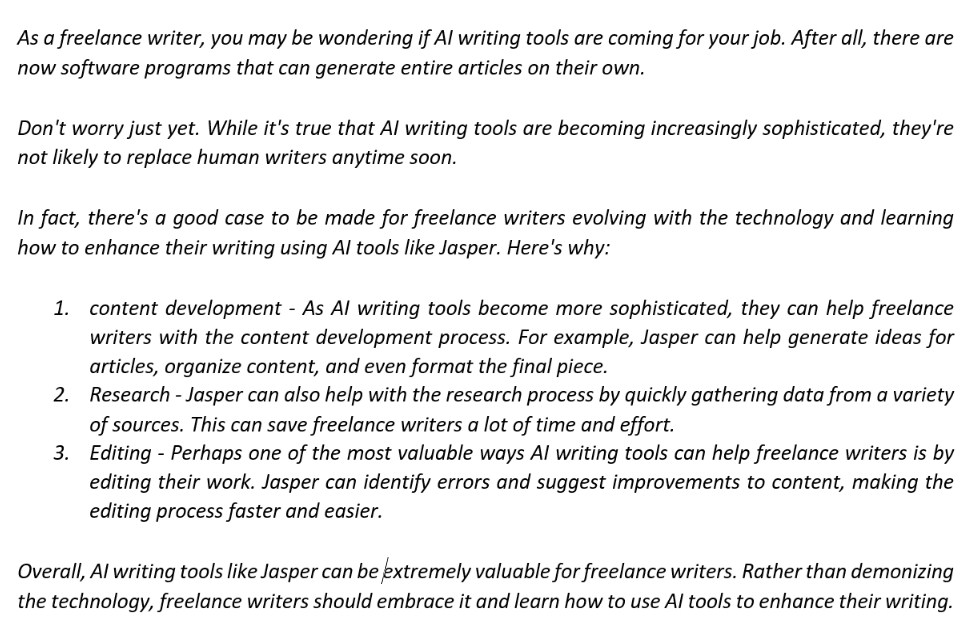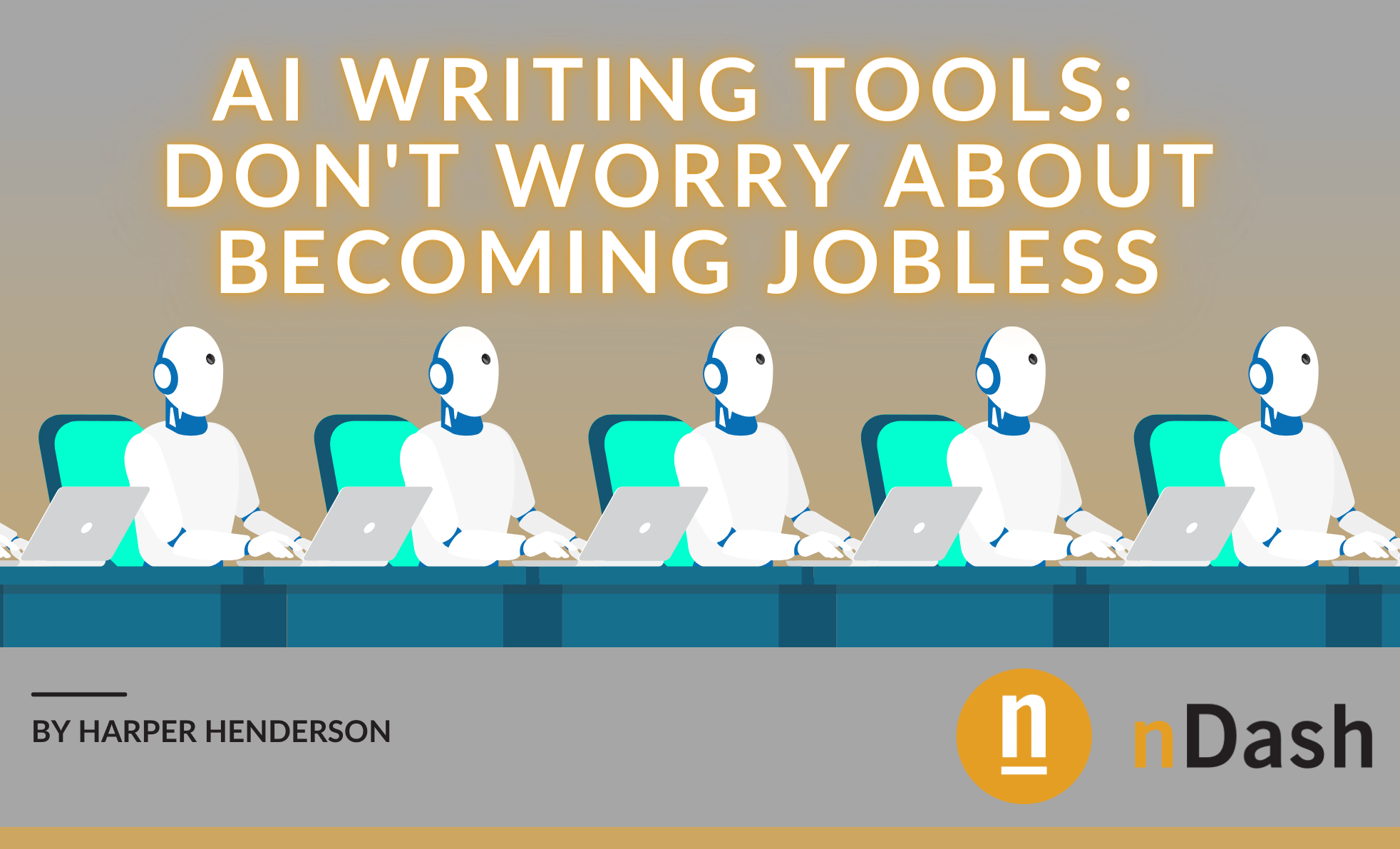It’s an age-old paradox, personified in dozens of media, theorized since the 60s, and striking fear in the hearts of industry experts everywhere. Robots will take our jobs!! And, in some instances, the unease is warranted. AI writing tools have exploded into the workforce, streamlining healthcare, logistics, automotive, banking, and cybersecurity industries, for example.
The freelance writing community has found itself in a cold sweat within the last few years. Are we next? In a world where SEO rules on high, deadlines are tight, and keywords are king, it isn’t hard to fall prey to the mentality that somehow, somewhere, a computer could do your job better, faster, and cheaper than you.
I’m here to tell you, “fear not.” I’m here to explain why AI writing tools won’t replace you, nor will they shrink your opportunities as a freelance writer.
In fact, if you consider utilizing this technology to optimize your own work and develop content more quickly, you might end up better off. I mean, what could possibly go wrong, the singularity?
AI Writing Tools: An Overview of the Software’s Capabilities
Let’s start simple. What are AI writing tools, and how do they work? First, AI writing software is basically brand new (aside from spellcheck and Grammarly, of course) and in its infancy. There aren’t many tools that will write a compelling and relevant article in its entirety. For now, this software is an aid for companies to quickly pump out landing pages, blog posts, and advertisements.
GPT-3 is currently the most advanced writing tool on the market. In fact, it wrote a whole article for The Guardian, and you can read it here. While interesting, this is not a commonplace practice to “hire” bots to postulate and reason.
That’s our job. The bot’s job is to synthesize information from the entire internet and form coherent sentences relevant to the prompt.
The client provides the topics, keywords, and target audiences, and the software then generates “original content” that, in most cases, falls flat. From those who have tried the software themselves, the consensus is that the content is lifeless and devoid of emotion which, coming from a robot, is unsurprising.
There is no quick-fix replacement for professional human writing skills regardless of the utopian (dystopian?) promises of computer-generated genius. And I’m not sure the creators of these tools intend to render writers obsolete. Instead, we might consider this a huge win if we take the right perspective.
But don’t just take it from me. I spoke with Paul Caspian, a writer with 15 years of experience. Given his years in the industry, you’d think he’d be resistant to technology that might threaten his livelihood. However, his insight into AI software is refreshing and applicable to all of us.
An Expert Opinion About AI Writing Tools
Paul tried his hand at using a handful of AI writing tools, one of which, Jasper, is gaining popularity. He had some comments about Jasper’s ability to develop content. “It doesn’t provide any unique insight or perspectives – so if you don’t provide it with specific direction, it will only produce low-value content.” However, Paul insists that providing the engine with “good inputs and specific instructions, they can be very useful and save you time and effort.”
In other words, what Paul is trying to say is that we shouldn’t fear the advancement of technology. Instead, we should see it as a card up our sleeves to streamline and optimize our writing processes. We could be churning out multiple high-quality pieces daily if we utilize these tools instead of villainizing them. So, how do we make AI work for us rather than compete with us?
A Controlled Experiment
For the sake of science, research, and curiosity, I started a free trial with Jasper. I thought it might be fun to challenge it (him?) to write the same blog post as me. I’ll let you be the judge of who won. I’ll paste the AI blog post, unedited, below. I input the topic, keywords, and brief description of what to cover, and this is what Jasper came up with:

After using Jasper, I drew the same conclusions as our good friend Paul. The bot did precisely what I told it to and nothing more. It was a tad…uninspired. That’s not to say it wasn’t informational, but if I came across this blog, I would probably continue looking for something more authoritative. Jasper was great at gathering information and putting words together coherently. Would I rely on it to be witty, conversational, and commanding? No, because that’s my job as a writer.
A Framework for Befriending the Robots
First, we need to set reasonable expectations for the capabilities of the AI software. If you’re anything like me, you won’t want the bots to do all the work, but saving time on research and synthesis sounds pretty nice, right?
Paul’s method for using the programs has increased his productivity, and I think we could all benefit from trying our hand at it, too. Here are some examples of benefits:
- Think of the tool as a helpful part of your professional toolset and not as a crutch is critical
- Handle the software as a research assistant to gather and summarize information from the internet. Imagine all the relevant source links you could gather in seconds. How long would that take you on your own?
- Use the software to expand on points you’ve already made. For example, definitions of uncommon terms and providing synonym suggestions should your content be unintentionally repetitive.
- Manage the software as an idea generator. Paul commanded the bot to “list out some headings for an article on effective supply chain management.” The software gave him some ideas he hadn’t considered
- Instruct the software to write specific paragraphs when you’re stuck. For example, you could tell the program to write a 200-word paragraph introducing a subject you’re not very knowledgeable of
Understanding that the AI-generated content will not always be perfect – you may have to do some rephrasing and light editing to perfect the content and ensure it still carries your tone.
Final Thoughts About AI Writing Tools
Doesn’t sound so evil and daunting now, does it? As writers, we’ve had to adapt to the market changes, roll with the punches, overcome obstacles, and we’re still here, aren’t we? Do you think this is how writers felt about typewriters in the 1800s? We have to learn a new skill, or else we’ll be obsolete! And what did they do? They learned to type and carried on. We can do the same. Don’t be discouraged that the world is evolving around us. Evolve with it.
*Paul is a moderator for the Freelance Writer subreddit. The group has over 90,000 members who meaningfully contribute to advice, support, and converse with fellow freelancers.
This post is by nDash community member Harper Henderson. She specializes in academic writing, health and wellness pieces, and B2B communications.
